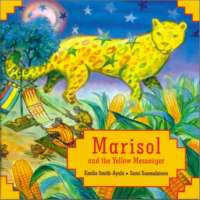
Marisol learns about identity, loss, and the continuation of love and hope after her father is killed and her family must move north from Latin America, but through dreams she discovers her father’s presence, but in a different way than before.

Marisol learns about identity, loss, and the continuation of love and hope after her father is killed and her family must move north from Latin America, but through dreams she discovers her father’s presence, but in a different way than before.
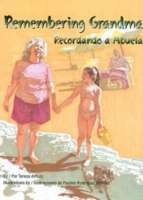
A poignant bilingual picture book about the death of a grandmother Like most Saturdays, Mr. García’s rooster wakes Lorena much earlier than she wants to wake up. Lorena pulls the covers over her head to block out the day, but she knows she has to get up. Today is no ordinary Saturday. She and her mother will be going to Grandpa’s house. Since Grandma’s recent death, everything has changed for Lorena. Her mother often cries, and Grandpa sits motionless in his chair staring out the window. Though Mamá says Grandma must be in heaven, Lorena misses Grandma, too. She can’t see or touch heaven. Where is Grandma? At Grandpa’s house, Lorena tries to help him stop grieving, but not even Grandma’s miracle words, “sana, sana, colita de rana…” work. How can Lorena help Grandpa? Lorena notices a beatiful carved chest in the corner of the room. When Lorena opens it, she sees a tangle of colors, fabrics, and keepsakes from when Grandma was alive.
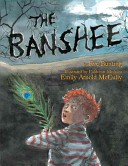
Terry is half asleep when he hears the wailing, rising and falling like the waves of the sea. He wishes it were a dream, but he knows it isn’t. It isn’t an owl screeching, either. Or the Flannerys’ old cat. Could it be the Banshee—the ghostly figure of Irish legend who wails outside a house when death is near? Why would she come here? In spite of his fears, Terry goes out to confront her.

Crystal had lived in the garden for many years and she was growing old–Zelda was just starting out in life and though she was young, she and Crystal were best friends, but one day Crystal was not in the garden, she had died; in this gentle, beautifully illustrated story, children learn, with Zelda, that true friendship is a gift that doesn’t die.
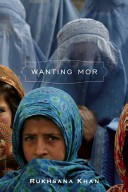
Jameela and her family live in a poor, war-torn village in Afghanistan. Even with her cleft lip and lack of educational opportunities, Jameela feels relatively secure, sustained by her Muslim faith and the love of her mother, Mor. But when Mor dies, Jameela’s father impulsively decides to start a new life in Kabul. Jameela is appalled as he succumbs to alcohol and drugs, then suddenly remarries, a situation that soon has her a virtual slave to a demanding stepmother. After she’s discovered trying to learn to read, Jameela is abandoned in a busy market, eventually landing in an orphanage run by the same army that killed so many members of her family. Throughout it all, the memory of her mother sustains her, giving Jameela the strength to face her father and stepmother when fate brings them together again. Inspired by a true story, and set in a world far removed from that of Western readers, this powerful novel reveals that the desire for identity and self-understanding is universal.
Take a closer look at Wanting Mor as examined in WOW Review.
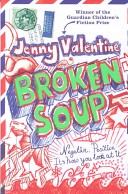
This book is compelling, intriguing, revelatory- Jenny Valentine’s new novel will reach out and grab you by the heart.
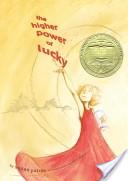
Lucky, age ten, can’t wait another day. The meanness gland in her heart and the crevices full of questions in her brain make running away from Hard Pan, California (population 43), the rock-bottom only choice she has.
It’s all Brigitte’s fault — for wanting to go back to France. Guardians are supposed to stay put and look after girls in their care! Instead Lucky is sure that she’ll be abandoned to some orphanage in Los Angeles where her beloved dog, HMS Beagle, won’t be allowed. She’ll have to lose her friends Miles, who lives on cookies, and Lincoln, future U.S. president (maybe) and member of the International Guild of Knot Tyers. Just as bad, she’ll have to give up eavesdropping on twelve-step anonymous programs where the interesting talk is all about Higher Powers. Lucky needs her own — and quick.
But she hadn’t planned on a dust storm.
Or needing to lug the world’s heaviest survival-kit backpack into the desert.
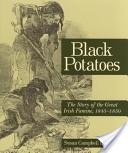
In 1845, a disaster struck Ireland. Overnight, a mysterious blight attacked the potato crops, turning the potatoes black and destroying the only real food of nearly six million people. Over the next five years, the blight attacked again and again. These years are known today as the Great Irish Famine, a time when one million people died from starvation and disease and two million more fled their homeland. Black Potatoes is the compelling story of men, women, and children who defied landlords and searched empty fields for scraps of harvested vegetables and edible weeds to eat, who walked several miles each day to hard-labor jobs for meager wages and to reach soup kitchens, and who committed crimes just to be sent to jail, where they were assured of a meal. It”s the story of children and adults who suffered from starvation, disease, and the loss of family and friends, as well as those who died. Illustrated with black and white engravings, it”s also the story of the heroes among the Irish people and how they held on to hope.
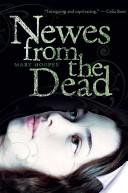
Class and gender inequalities of 17th-century England and the state of medicine at the time are explored through the real and gripping story of Anne Greene, an innocent young woman who was hanged and presumed dead, but awakens on the dissection table. Alternate chapters are narrated by Anne and Robert, an Oxford medical student.
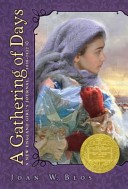
The journal of a fourteen-year-old girl, kept the last year she lived on the family farm, records daily events in her small New Hampshire town, her father’s remarriage, and the death of her best friend.